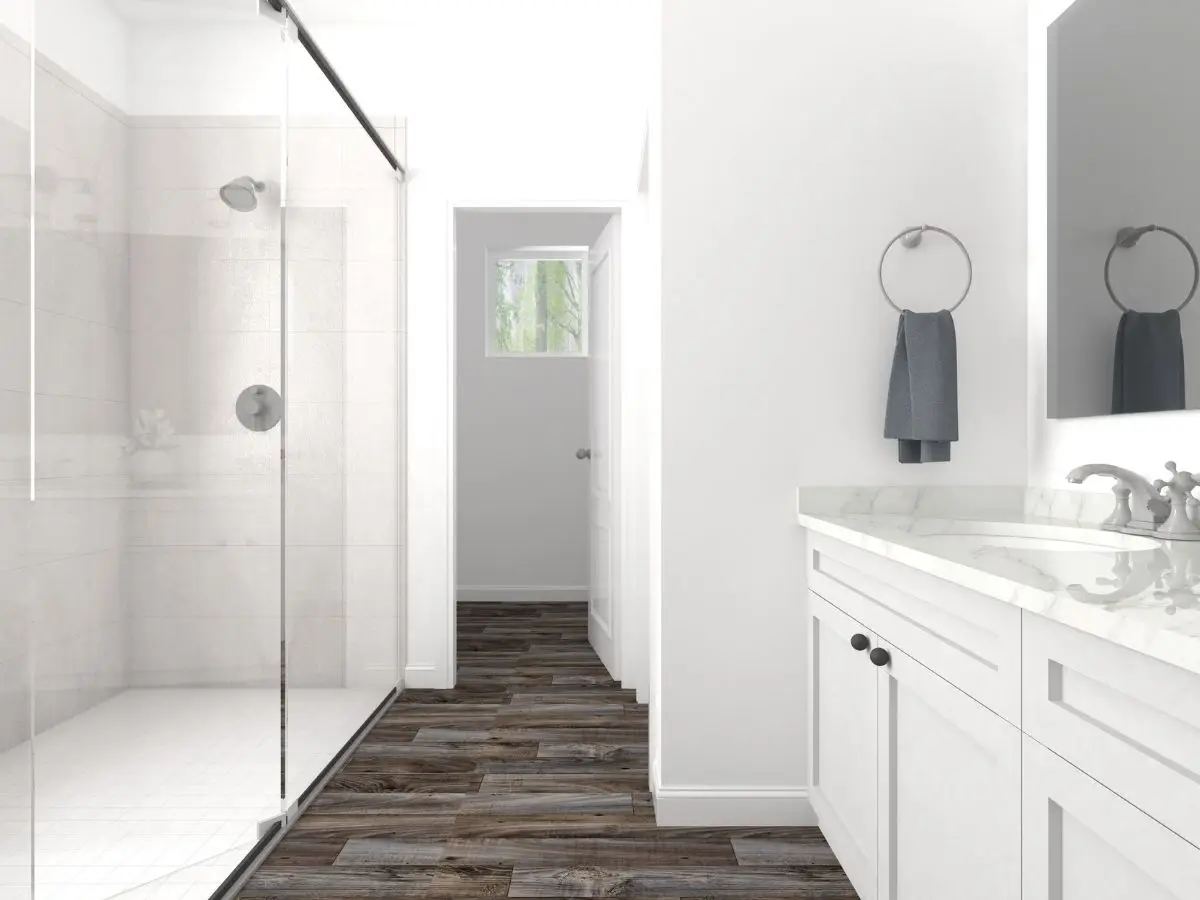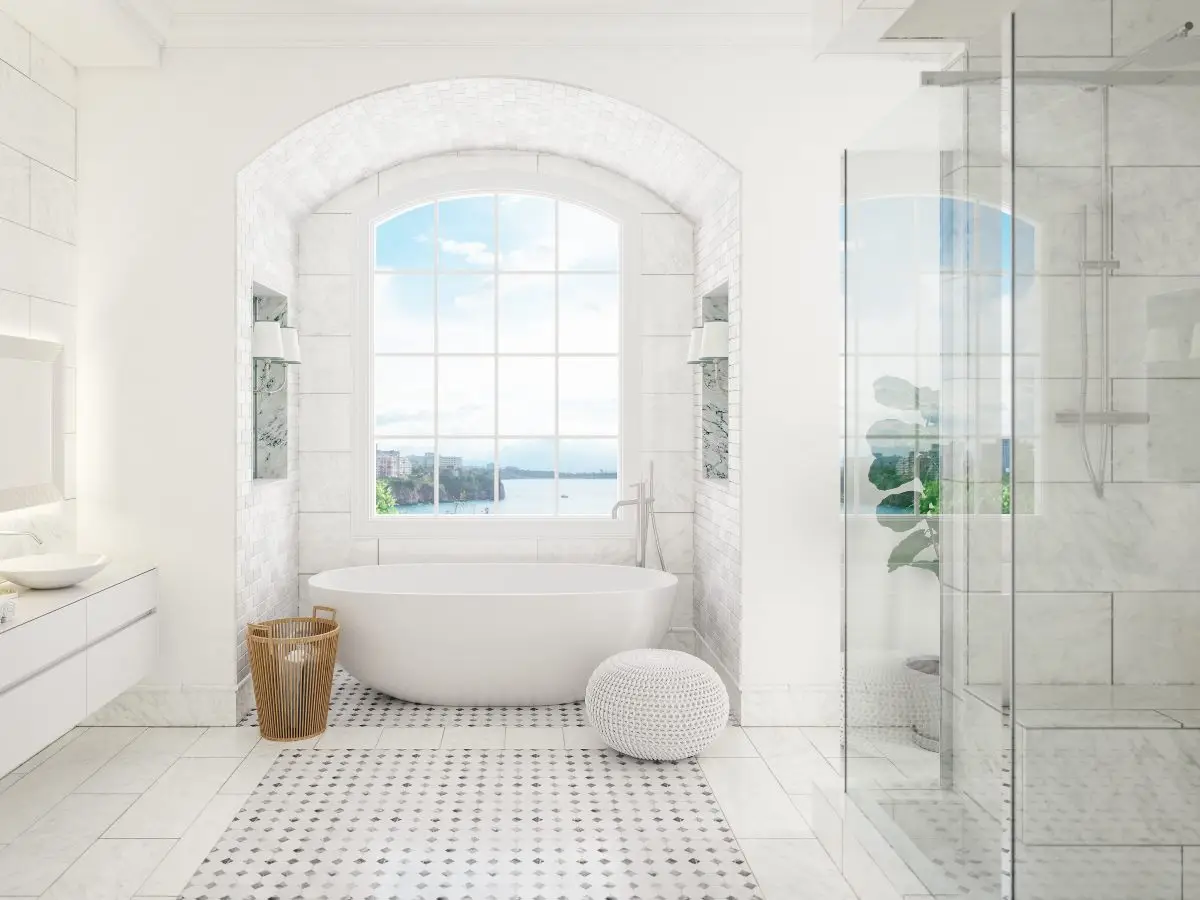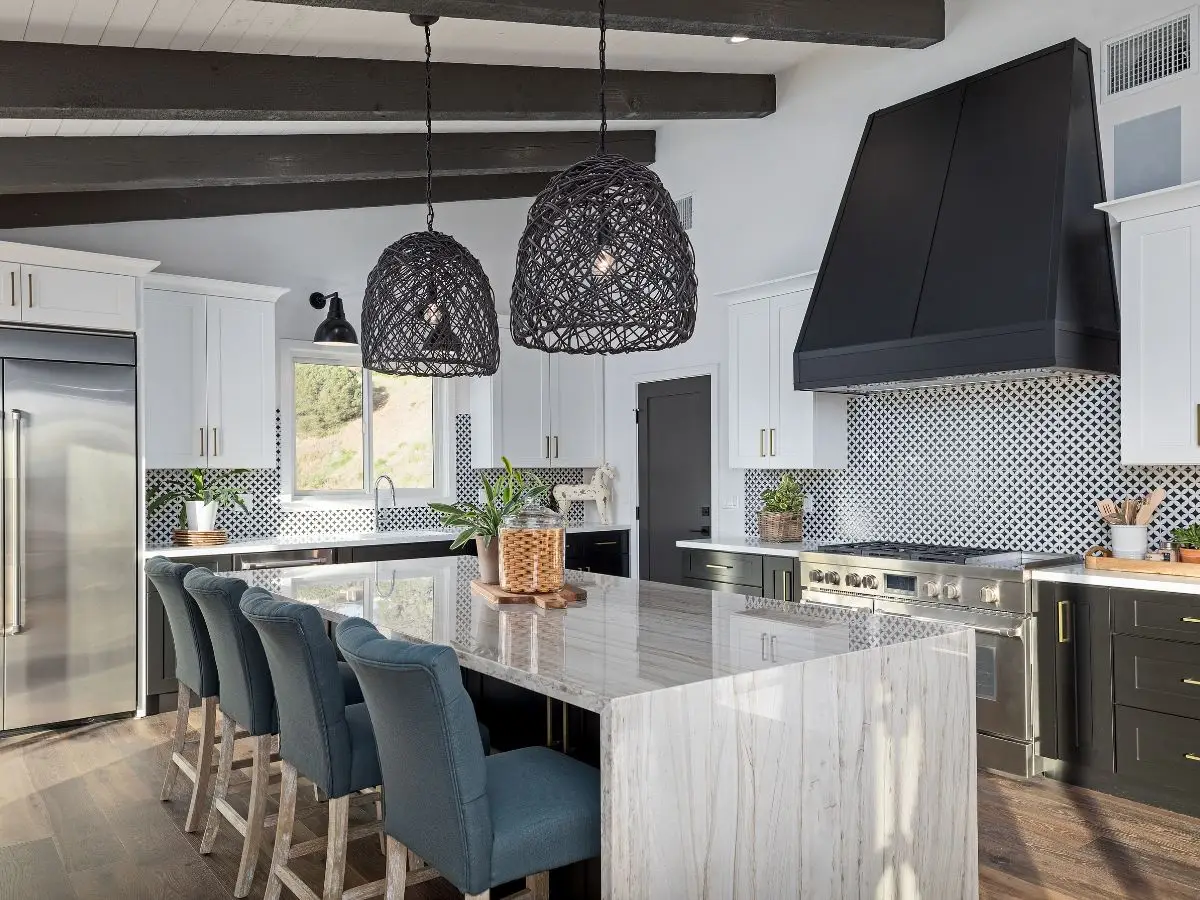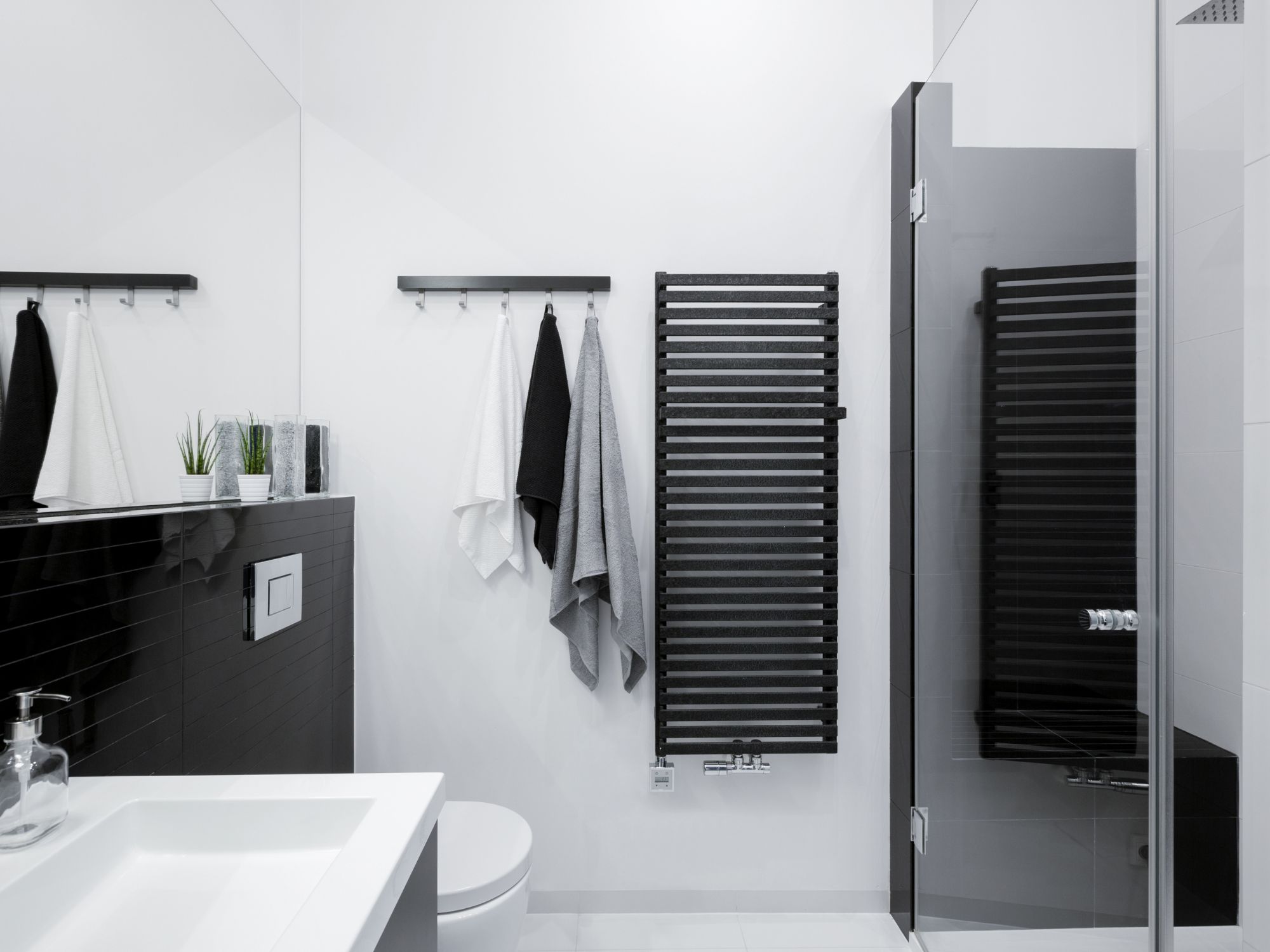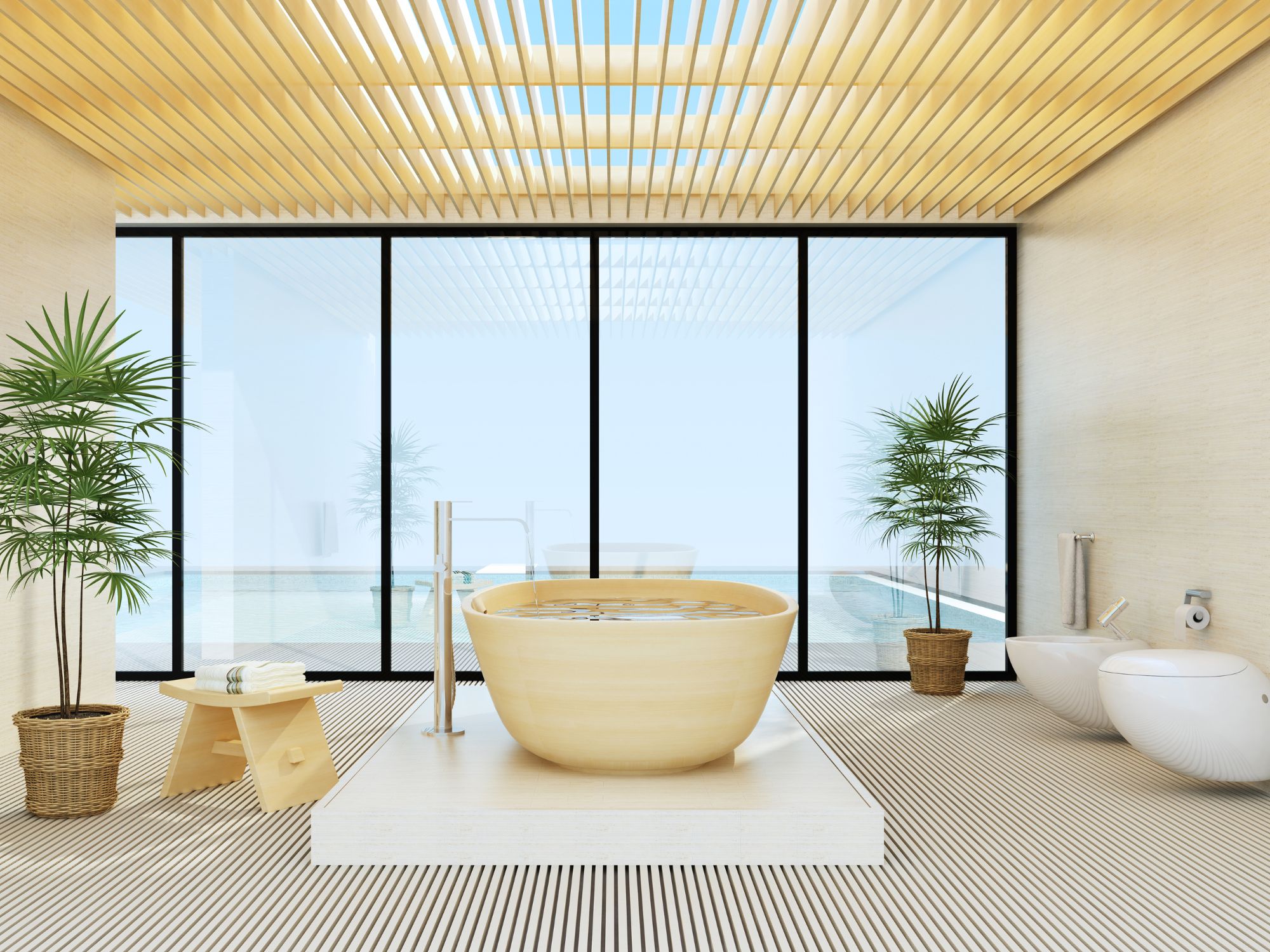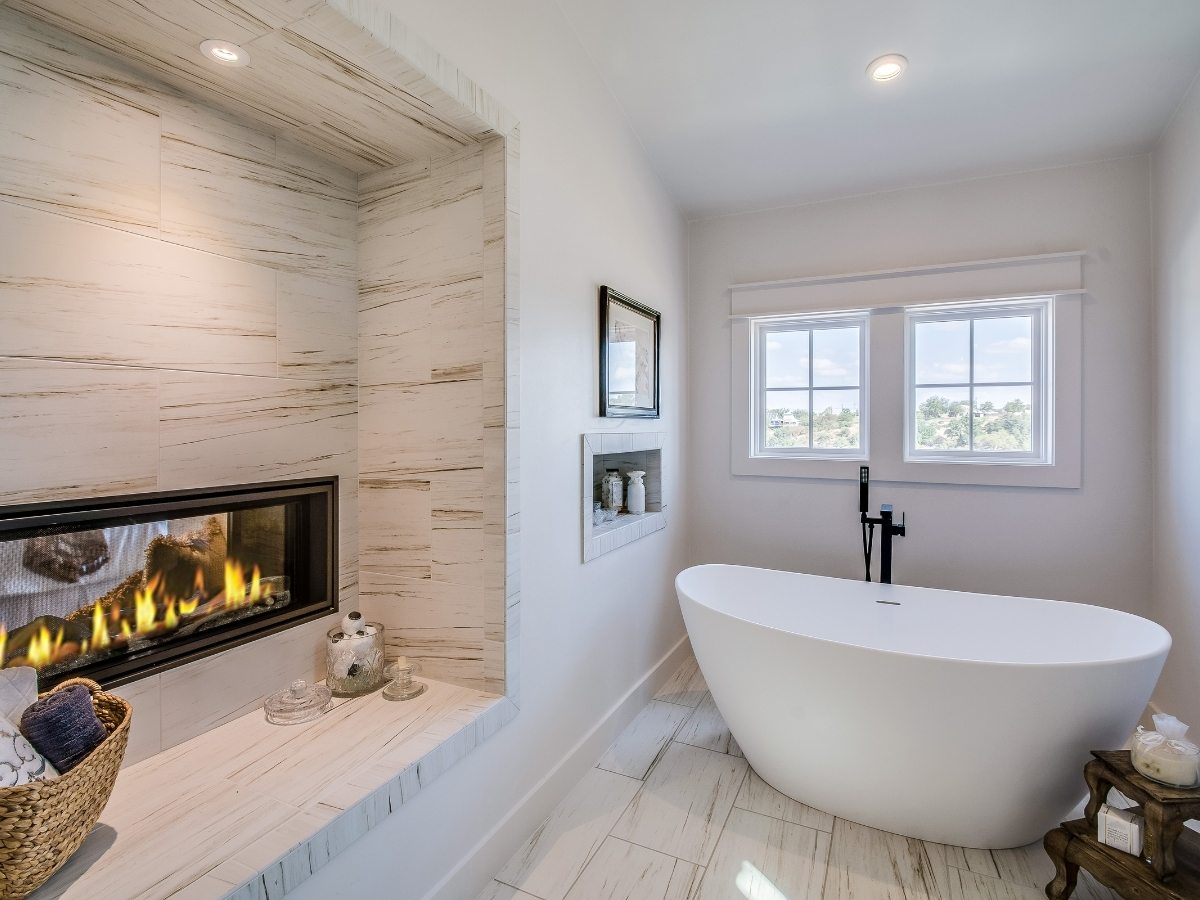This post may contain affiliate links which means I may receive a commission for purchases made through links. I only recommend frameless shower door and enclosure products that I have personally used or curated specifically after reviewing and ensuring its quality! Learn more on my Private Policy page.
1. the Right Shower Door – framed vs frameless shower door
When it comes to designing a modern bathroom, the choice of a shower door plays a pivotal role e.g. framed vs frameless shower door; sliding vs hinged. Not only does it define the overall aesthetic appeal of the space, but it also impacts the functionality and feel of your shower experience.
Today’s market offers a diverse range of shower doors, each catering to different tastes and bathroom layouts. From frameless shower doors that evoke a sleek, minimalist vibe to more traditional framed options, the selection is vast.
This article aims to guide you through these varieties, helping find the perfect door for your shower sanctuary.
2. Types of Shower Doors
Framed vs. Frameless Shower Door
The choice between framed and frameless shower doors is one of the most significant decisions when designing or remodeling a bathroom. Each style has its unique advantages in terms of structure, appearance, and maintenance. Understanding these differences can help homeowners select the best option for their space and lifestyle.
Framed Shower Doors: Framed shower doors are built with a sturdy metal frame that surrounds the edges of the glass panels, providing enhanced structural support. The metal frame reinforces the door’s stability, making it less likely to shift or misalign over time. This feature makes framed shower doors highly durable and long-lasting.
These doors are available in various finishes, including chrome, brushed nickel, and oil-rubbed bronze, allowing homeowners to match them with their existing bathroom fixtures. Decorative options such as frosted or patterned glass can add a personalized touch while maintaining privacy.
One notable advantage of framed shower doors is their lower cost compared to frameless options. They are often easier to install, making them a practical choice for budget-conscious renovations. However, the metal frame can be prone to collecting soap scum and mineral buildup, requiring more frequent cleaning.
Frameless Shower Doors: Frameless shower doors have become synonymous with modern bathroom design due to their sleek and minimalist appearance. Made with thicker, tempered glass, these doors rely on discreet hardware such as hinges and clips for support. The absence of a bulky frame creates a seamless look that visually enlarges the bathroom, making it ideal for smaller spaces.
In addition to aesthetics, frameless doors are easier to maintain, as there are no frames where mold or grime can accumulate. A simple wipe-down keeps the glass looking crystal-clear. While frameless options tend to be more expensive and require professional installation, their high-end appearance and durability often justify the investment.
Choosing between framed and frameless shower doors ultimately depends on personal style preferences, budget considerations, and maintenance expectations. Both options can enhance the bathroom’s functionality and visual appeal when chosen thoughtfully.
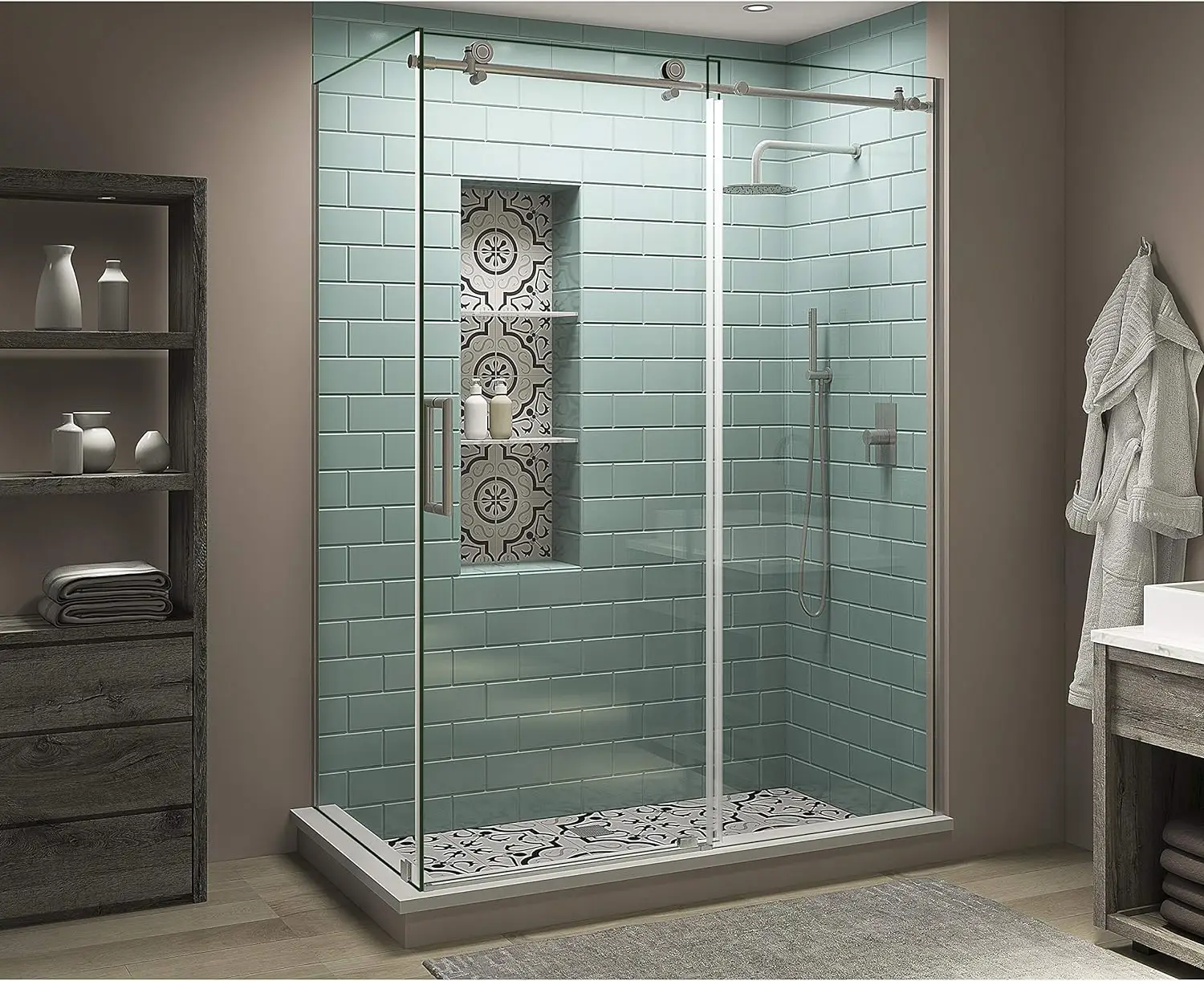
Sliding Shower Doors
Sliding shower doors, also known as bypass doors, are a popular choice for bathrooms where maximizing space is essential. These doors operate by sliding along a track, eliminating the need for outward-swinging clearance and making them perfect for compact or narrow bathrooms.
Design and Functionality: Sliding shower doors typically consist of two or more glass panels that glide smoothly past each other on a track system. This design ensures that the door doesn’t encroach on the bathroom’s floor space, making it especially suitable for small or crowded layouts.
The modern engineering behind sliding doors ensures quiet, fluid motion thanks to advanced rollers and glide systems. These features improve user experience and longevity, reducing wear and tear on the door’s components. Many models offer soft-close technology, which prevents slamming and extends the door’s lifespan.
Aesthetic Appeal: In terms of aesthetics, sliding shower doors provide a streamlined and contemporary appearance. They are available in a variety of glass styles, including clear, frosted, and textured designs, catering to both privacy needs and design preferences. Frame finishes such as matte black, polished chrome, or brushed nickel add further customization possibilities.
Maintenance Considerations: Maintaining sliding shower doors is relatively simple. Regular cleaning of the glass panels and tracks prevents soap scum buildup and ensures smooth operation. Some models feature easy-clean coatings that repel water and reduce staining, simplifying maintenance even further.
Sliding shower doors strike an ideal balance between practicality and style, making them a versatile option for bathrooms of all sizes. Their space-saving design and customization potential make them a favorite among homeowners and designers alike.
Hinged and Pivot Doors
For those with more spacious bathrooms or custom shower enclosures, hinged and pivot shower doors offer a sophisticated and functional solution. These doors provide generous access while adding a touch of luxury to any bathroom design.
Hinged Shower Doors: Hinged shower doors operate like traditional doors, swinging outward or inward on hinges attached to the wall or shower frame. Their straightforward design makes them ideal for larger bathrooms with ample clearance space. They offer a classic and elegant look that suits both modern and traditional interiors.
Hinged doors are highly customizable in terms of size, glass type, and hardware finish. Homeowners can choose from clear glass for an open, airy feel or frosted glass for added privacy. Hinged doors are often paired with fixed glass panels to create expansive, walk-in shower enclosures.
Pivot Shower Doors: Pivot shower doors function similarly but have a slight design variation. Their hinges are mounted at the top and bottom, allowing the door to rotate on a central axis. This design enables the door to swing both inward and outward, offering flexible entry options. Pivot doors work well for larger enclosures and can accommodate unique bathroom layouts.
Design and Customization: Both hinged and pivot doors can be fully customized to fit specific dimensions and aesthetic preferences. They are available in frameless or semi-frameless styles, featuring minimal hardware for a sleek, modern look. Finish options include polished metals, matte black, and even custom colors for maximum personalization.
Maintenance and Longevity: Routine maintenance involves cleaning the glass and ensuring hinges or pivot points remain lubricated and free from buildup. Many high-end models come with protective glass coatings that resist water spots and mineral deposits.
Overall, hinged and pivot shower doors combine elegance, functionality, and customization potential, making them an excellent choice for bathrooms designed with luxury and performance in mind.

3. Styles and Shapes – Frameless door, Frameless Shower Door
Glass Varieties: In the realm of shower doors, the type of glass you choose plays a pivotal role in determining the overall look, feel, and functionality of your bathroom. From enhancing openness to providing privacy and artistic flair, glass varieties offer a wide range of customization options tailored to diverse design preferences.
Clear Glass: Clear glass is a timeless choice that creates a sense of openness by allowing light to flow freely throughout the bathroom. It makes the shower area feel larger and more inviting, offering an unobstructed view of the shower’s interior. Clear glass is often used in modern, minimalist designs where a clean and spacious aesthetic is desired.
To maintain its pristine appearance, clear glass requires regular cleaning to prevent water spots and soap scum buildup. Many manufacturers now offer protective coatings that reduce maintenance efforts by repelling water and stains.
Frosted Glass: Frosted glass strikes a balance between transparency and privacy, making it ideal for shared bathrooms. The frosted surface diffuses light while obscuring visibility, ensuring privacy without sacrificing brightness. It comes in various opacity levels and patterns, from simple matte finishes to intricate designs.
Frosted glass adds elegance and softness to the bathroom, blending well with both traditional and contemporary styles. Its textured surface also makes fingerprints and smudges less noticeable, simplifying upkeep.
Textured and Patterned Glass: Textured and patterned glass varieties introduce artistic elements to the shower enclosure. These designs range from subtle ripples and waves to bold, decorative patterns. They provide privacy while serving as a focal point, adding character and visual interest.
These options allow homeowners to express personal style while maintaining a functional, water-resistant barrier. Whether aiming for a modern, rustic, or artistic look, textured and patterned glass delivers a distinctive design statement.
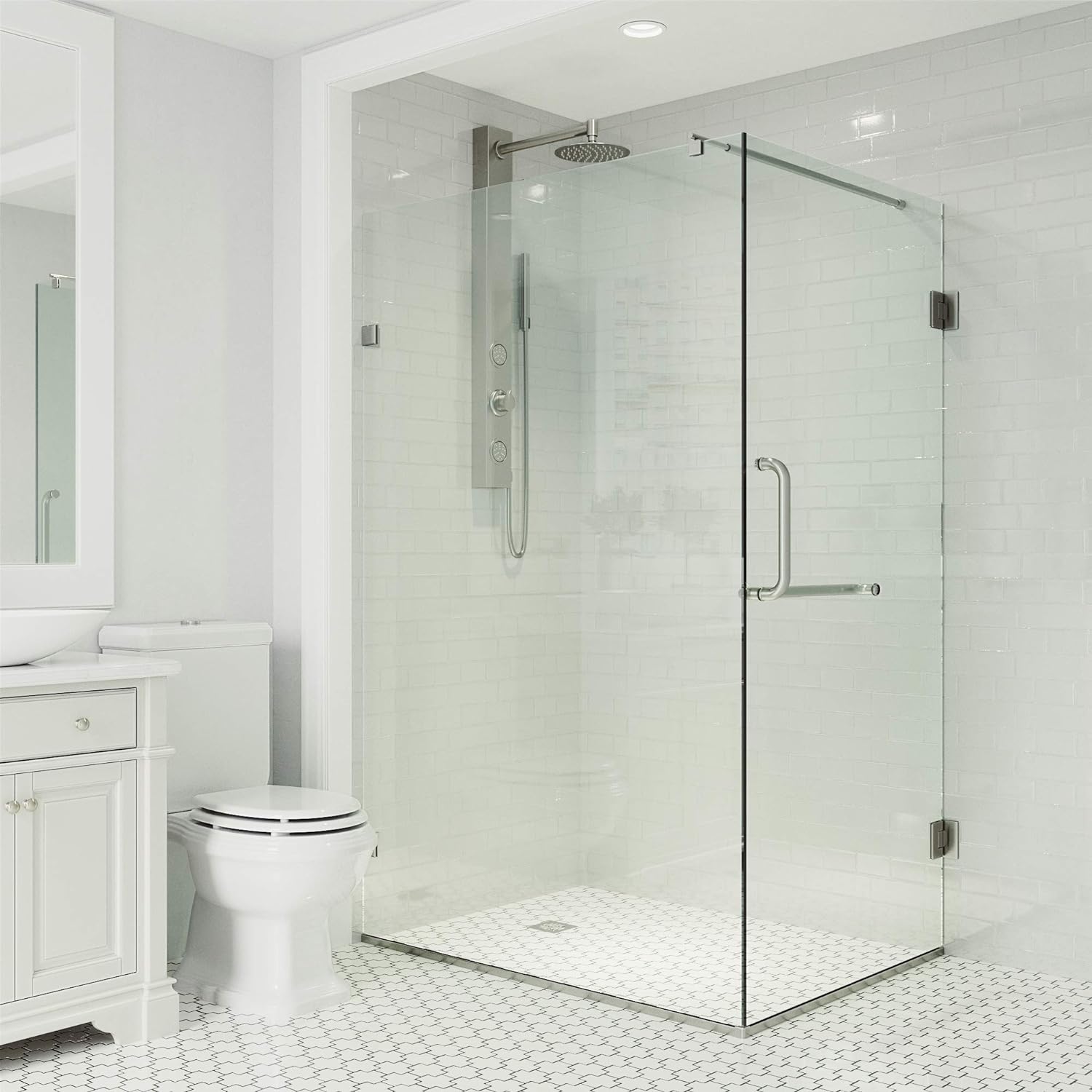
Unique Shapes and Sizes of Frameless Shower Doors
Custom Shower Door Designs: Custom shower door designs offer tailored solutions for unique bathroom layouts, ensuring both functionality and visual appeal. They are particularly essential for non-standard shower spaces where off-the-shelf options may not fit properly. Custom designs allow homeowners to maximize space, enhance comfort, and express personal style through various configurations, glass types, and hardware finishes.
Neo-Angle Shower Doors: Neo-angle shower doors are commonly used in corner showers, making them a popular choice for bathrooms where efficient use of space is crucial. These doors feature angled glass panels that create a geometric enclosure, helping to optimize layout while maintaining a modern and stylish appearance. Neo-angle designs work well in compact bathrooms because they fit neatly into corners, freeing up valuable floor space.
Customization options for neo-angle doors include clear, frosted, or textured glass, as well as frame finishes like chrome, brushed nickel, and matte black. Homeowners can also choose between framed and frameless versions, depending on their desired aesthetic and budget.
Curved Shower Doors: Curved shower doors add an elegant and luxurious touch to bathrooms, making them ideal for walk-in showers and larger spaces. The gentle curve of the glass creates a spacious and inviting shower area while enhancing the bathroom's visual flow. These doors are often used in high-end bathroom designs due to their sophisticated and custom-built appearance.
Custom curved doors are typically frameless to maintain a sleek, uninterrupted look. The glass can be clear or frosted, depending on privacy preferences, and comes in various thicknesses for added durability. Precision installation is essential for curved designs to ensure a perfect fit and smooth operation.
Frameless Custom Shower Doors: Frameless custom shower doors are a popular choice for modern bathrooms due to their clean, minimalist aesthetic. They offer unparalleled design flexibility, accommodating unique shapes, angles, and sizes. Frameless doors rely on sturdy tempered glass and precision hardware, including discreet hinges and brackets, to maintain stability.
One of the biggest advantages of frameless designs is their ability to create a seamless, open look, making the bathroom appear larger and more luxurious. Homeowners can personalize their frameless shower doors with custom etching, patterned glass, or specialty finishes for the hardware. While frameless options tend to be more expensive, their high-end appeal and durability often justify the investment.
Framed Custom Shower Doors: For those seeking a more defined structure and classic appeal, framed custom shower doors offer a practical and stylish solution. These doors feature a metal frame that supports the glass panels, providing added stability and durability. The frame itself can become a design element, with finishes ranging from polished chrome to matte black or even custom colors.
Framed custom doors are highly versatile and can be tailored to fit unconventional spaces, including angled ceilings, alcoves, or oversized showers. They are also more cost-effective than frameless models, making them a suitable choice for budget-conscious renovations.
Layout and Space Considerations: Understanding the layout of your bathroom is key when choosing a custom shower door design. Consider the available space, door swing clearance, and placement of other fixtures such as vanities and toilets. For compact bathrooms, sliding or bi-fold doors may be more practical, while spacious bathrooms can accommodate hinged, pivot, or even open-concept walk-in enclosures.
Additionally, accurate measurements are critical to ensuring a perfect fit. Professional consultation and installation are recommended for complex custom designs, as precise craftsmanship is essential for both functionality and visual appeal.
Design and Personalization: Custom shower doors allow for endless design possibilities, enabling homeowners to create a unique bathroom retreat that reflects their personal style. Popular customization options include:
Glass Types: Clear, frosted, textured, patterned, or tinted glass.
Frame Finishes: Chrome, brushed nickel, matte black, oil-rubbed bronze, or custom powder-coated colors.
Door Configurations: Sliding, hinged, pivot, bi-fold, or neo-angle designs.
Hardware Styles: Modern, traditional, or custom-designed handles, hinges, and brackets.
By working with experienced designers and installers, homeowners can create a one-of-a-kind shower enclosure that balances functionality, beauty, and long-lasting performance. Whether the goal is to make a bold design statement or solve specific layout challenges, custom shower door designs offer unmatched flexibility and creative potential.
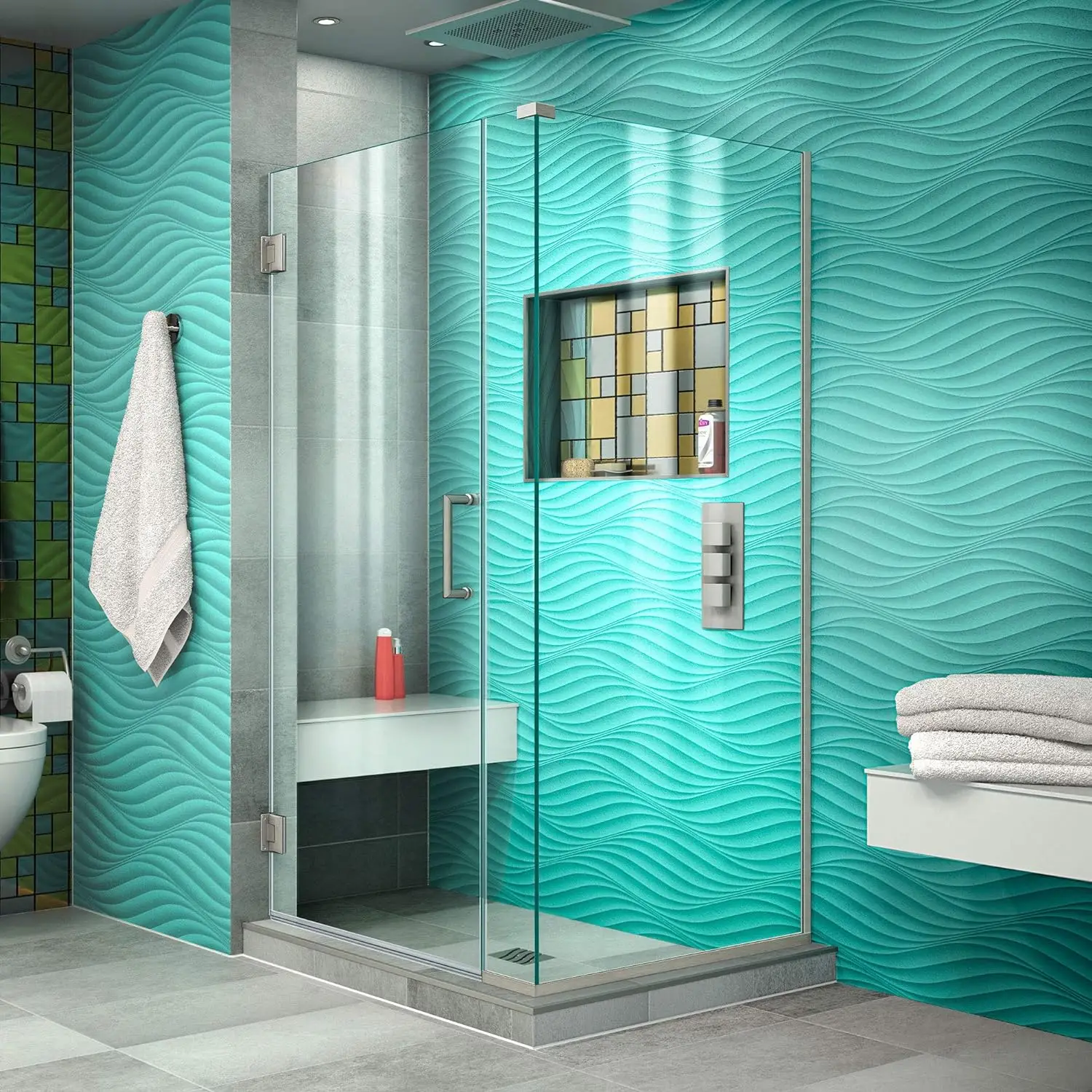
Frameless Shower Door – Modern vs. Traditional Styles
Selecting a Shower Door to Match Your Bathroom's Theme: Selecting a shower door that aligns with your bathroom's overall theme is crucial for creating a cohesive and visually pleasing space. The right shower door can enhance your bathroom’s style, tying together its design elements while serving as a functional centerpiece.
Modern Bathroom Themes: Modern bathroom designs often emphasize simplicity, clean lines, and minimalistic features. Frameless shower doors are the preferred choice in such settings because of their sleek, unbroken appearance. They complement contemporary fittings like wall-mounted vanities, floating sinks, and modern tile patterns. Clear glass is commonly used to maintain an open, airy ambiance, while matte black or brushed nickel hardware can add a bold contrast.
Homeowners can enhance the modern aesthetic by opting for sliding or pivot-style frameless doors, which offer both practicality and visual appeal. Minimalist handles, hinges, and frameless designs ensure that the shower enclosure blends seamlessly with the overall décor.
Traditional Bathroom Themes: Traditional bathroom designs lean toward classic elegance, often featuring intricate details and timeless materials. Framed shower doors work well in such spaces, providing structure and highlighting decorative elements. Bronze, brass, or oil-rubbed finishes can enhance a vintage-inspired look, while frosted or patterned glass offers added privacy with a touch of sophistication.
For a more classic appearance, consider doors with decorative etching, leaded glass designs, or even custom patterns that reflect historical or artistic themes. Hinged doors with ornate handles add a refined, old-world charm.
Creating a Balanced Look: Regardless of your bathroom’s style, the shower door should complement its fixtures, flooring, and wall finishes. Consider coordinating metal finishes across faucets, cabinet handles, and shower hardware for a unified design. By thoughtfully selecting a shower door that resonates with your bathroom’s theme, you can achieve a cohesive, visually stunning, and highly functional space.
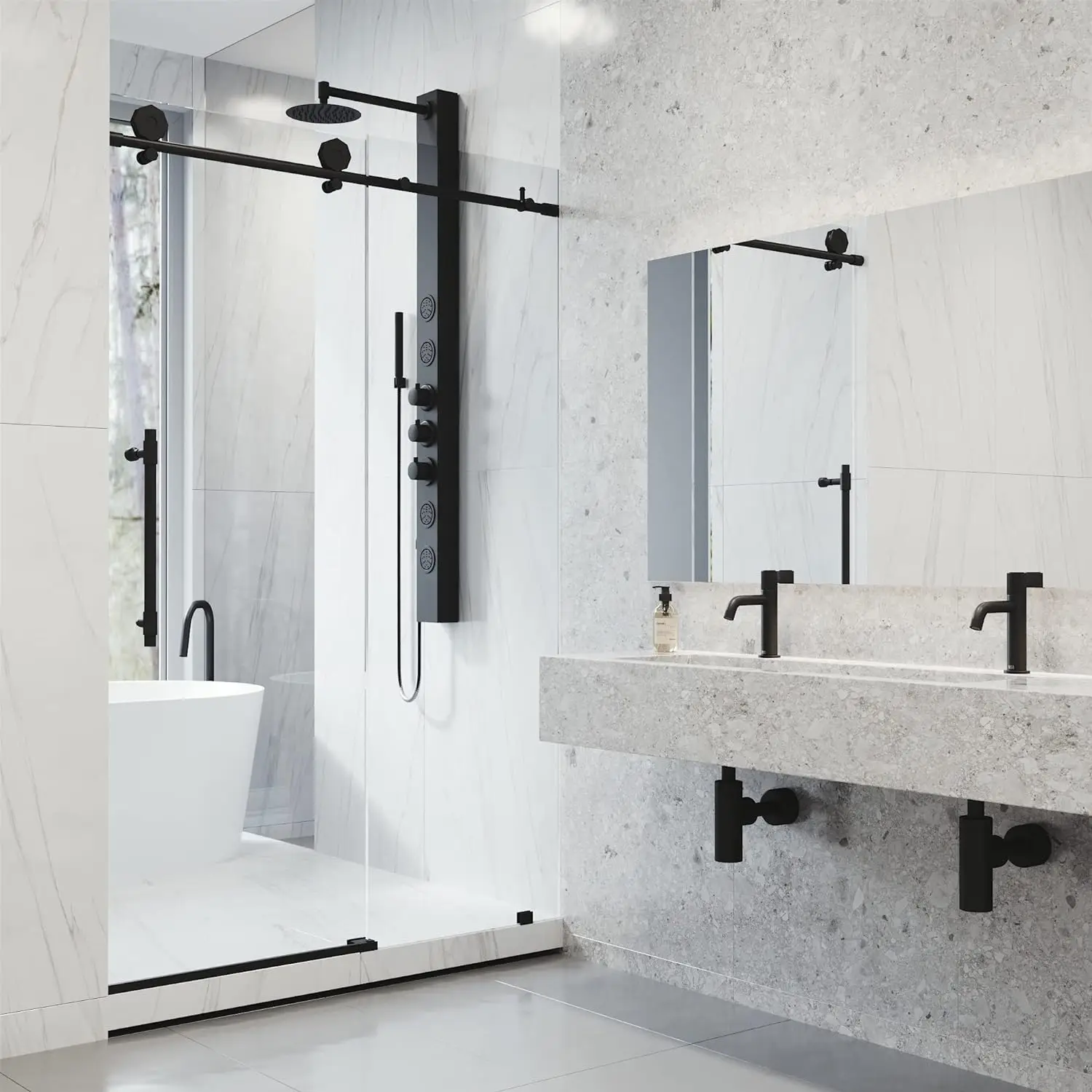
4. Aesthetic Features of Frameless Shower Door
Frame Finishes
The finish of your shower door’s frame significantly influences the bathroom’s overall look, setting the tone for its design style. Chrome finishes offer a bright, reflective quality that adds a sense of modern elegance. They complement contemporary bathrooms with sleek fixtures and clean lines. Chrome is also highly durable and resistant to corrosion, making it a practical choice for long-term use.
Brushed nickel provides a softer, matte appearance, lending a more understated, versatile look that pairs well with warm and neutral color schemes. Its muted finish hides water spots and fingerprints better than polished chrome, reducing maintenance requirements.
Matte black frames have surged in popularity due to their bold, contemporary appeal. They create striking contrasts against light-colored tiles and add a dramatic touch to any bathroom design. Matte black finishes are ideal for industrial, modern, or minimalist themes, helping create a strong design statement.
Oil-rubbed bronze frames introduce warmth and richness, enhancing traditional or rustic bathroom designs. This finish exudes classic charm and pairs well with earth-toned tiles and vintage-inspired fixtures. Maintenance considerations include periodic cleaning to maintain its rich appearance.
Custom powder-coated finishes offer an additional layer of personalization, allowing homeowners to match the frame color with their overall bathroom theme. These finishes are available in a range of colors and textures, enabling creative design possibilities.
Each frame finish not only contributes to aesthetics but also impacts durability and maintenance. Selecting a finish that aligns with your bathroom’s style while considering cleaning requirements ensures both beauty and practicality.
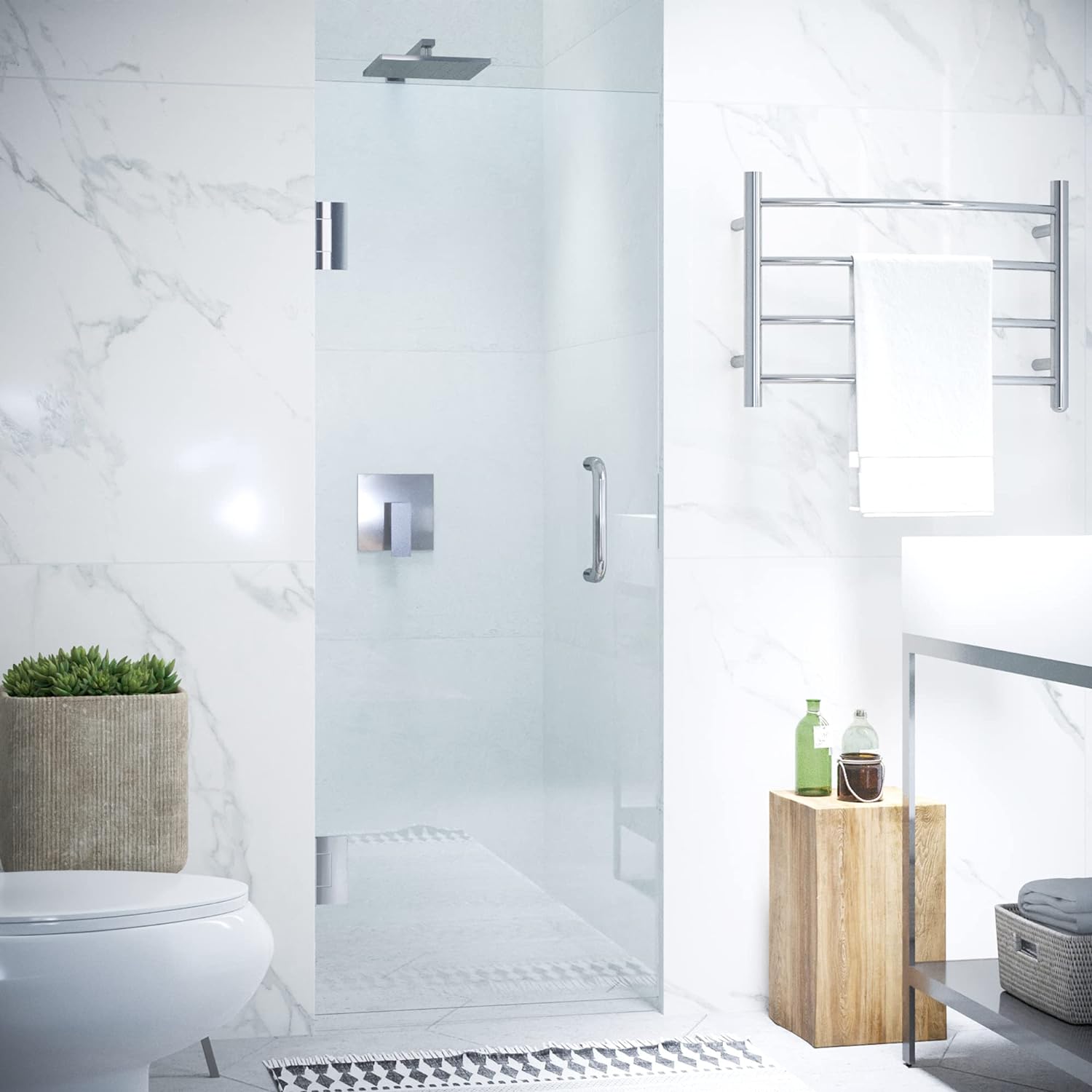
Decorative Elements of Frameless Shower Door
Integrating decorative elements into your shower door design can transform it into a stunning focal point while reflecting personal style. Etched glass patterns offer a touch of artistry, allowing homeowners to incorporate custom designs, geometric shapes, or nature-inspired motifs into the glass surface.
Colored glass provides an opportunity to introduce vibrancy and character. Subtle tints like gray or bronze add warmth and depth, while bolder hues create a statement-making feature. Homeowners can choose from a spectrum of colors to complement their bathroom’s palette and enhance the overall design.
Textured glass options, such as rain, fluted, or reed patterns, offer both visual interest and privacy. These textures diffuse light beautifully, creating a soft, inviting ambiance while obscuring visibility.
Custom engraving and sandblasting techniques provide additional avenues for artistic expression. From personalized monograms to intricate designs, these customizations can turn a standard shower door into a unique design piece.
Hardware finishes also play a decorative role. Stylish handles, hinges, and brackets in finishes like polished chrome, brushed nickel, or matte black can tie the overall design together. For a cohesive look, coordinating hardware with other bathroom fixtures is recommended.
Decorative elements allow for limitless creativity, enabling homeowners to craft a personalized and visually stunning shower enclosure that elevates the bathroom’s design.
Transparency vs. Privacy
Choosing between transparency and privacy in shower doors involves balancing personal preferences, design goals, and functional needs. Clear glass doors are an excellent choice for those who appreciate an open, spacious shower environment. They allow light to flow freely, enhancing visibility and creating a sense of airiness.
Clear glass also showcases intricate tile work, custom fixtures, and decorative accents within the shower enclosure, turning it into a visual highlight of the bathroom. However, clear glass requires regular cleaning to maintain its pristine appearance, as water spots and soap residue can be more noticeable.
For those seeking enhanced privacy, frosted glass is a popular option. Its translucent surface obscures visibility while still allowing light to filter through, ensuring a bright and welcoming shower space. Frosted glass can be achieved through acid etching or sandblasting processes, offering a range of design possibilities.
Textured glass, such as rain, fluted, or hammered patterns, provides both privacy and visual interest. These textures break up the glass’s surface, creating a dynamic interplay of light and shadows while reducing visibility.
Tinted glass offers another layer of privacy while adding depth and sophistication. Light bronze, gray, or blue tints can enhance the bathroom’s color scheme while providing a measure of concealment.
Smart glass technology offers a cutting-edge solution by allowing users to switch between transparency and opacity with the press of a button. This option is ideal for those who want flexibility in privacy levels without compromising modern aesthetics.
Ultimately, selecting between transparency and privacy depends on your lifestyle, design preferences, and the bathroom’s overall ambiance. Combining various glass types and textures can also create a unique, multi-functional shower enclosure that balances beauty, privacy, and light.
5. Installation and Operational Convenience – frameless shower door vs framed shower door
Ease of Installation
Ease of Installation: DIY vs. Professional Help: When it comes to shower doors, the ease of installation can range from straightforward DIY projects to complex installations that require professional expertise. Understanding the specific requirements of different shower door types is crucial in determining whether to attempt installation yourself or hire a professional.
Frameless Shower Doors: Frameless shower doors are prized for their modern, seamless appearance, but their installation can be challenging due to the absence of a supporting frame. These doors rely on precise measurements, sturdy hardware, and heavy-duty tempered glass, making correct installation essential for safety and durability.
One of the key challenges is ensuring that the walls are perfectly plumb and the floors level. Even slight irregularities can cause misalignments, affecting door operation and water containment. Installation involves drilling into tile or stone surfaces, a task best handled by experienced professionals to prevent cracking or damage.
Additionally, frameless doors require precise sealing to avoid water leakage. Professional installers use specialized tools and techniques to create a watertight seal while maintaining the door's clean and elegant look. While DIY installation may be possible for highly skilled homeowners, professional assistance is strongly recommended for frameless designs.
Sliding Shower Doors: Sliding shower doors, also known as bypass doors, are generally more DIY-friendly due to their guided track system. The installation process involves attaching the top and bottom tracks, mounting the door panels, and ensuring smooth sliding operation. Proper leveling and alignment are essential to prevent sticking or uneven movement.
Homeowners should be comfortable using tools such as drills, levels, and screwdrivers. Since sliding doors involve multiple components, following the manufacturer’s instructions carefully is critical. While DIY installation can be successful, professional help ensures a flawless fit and long-term functionality.
Framed Shower Doors: Framed shower doors are considered the most DIY-friendly option because their sturdy metal frames provide built-in support and structure. This added stability simplifies the installation process by minimizing the need for precise adjustments.
Installation typically involves attaching the frame securely to the walls and ensuring proper alignment before installing the glass panels. Sealing the edges with silicone caulk prevents water leaks. While the process is manageable for most DIY enthusiasts, precision and attention to detail are still important.
Key Installation Factors to Consider: Regardless of the type of shower door, several critical factors influence the ease of installation:
Safety Considerations: Shower doors are made of heavy glass, posing safety risks during handling and installation. Assistance may be necessary for lifting and securing large panels.
Skill Level: Evaluate your comfort and experience with home improvement projects. Installing shower doors often involves cutting, drilling, and measuring.
Tools and Materials: Ensure you have the necessary tools such as drills, screwdrivers, levels, and silicone sealants. Specialized tools may be required for frameless doors.
Bathroom Layout: Consider the layout and size of your bathroom. Tight spaces or uneven surfaces can complicate installation.
Measurement Accuracy: Precise measurements are essential to avoid installation issues. Double-check dimensions before purchasing a shower door.
Water Sealing: Proper sealing is critical to prevent water leaks and damage to surrounding areas.
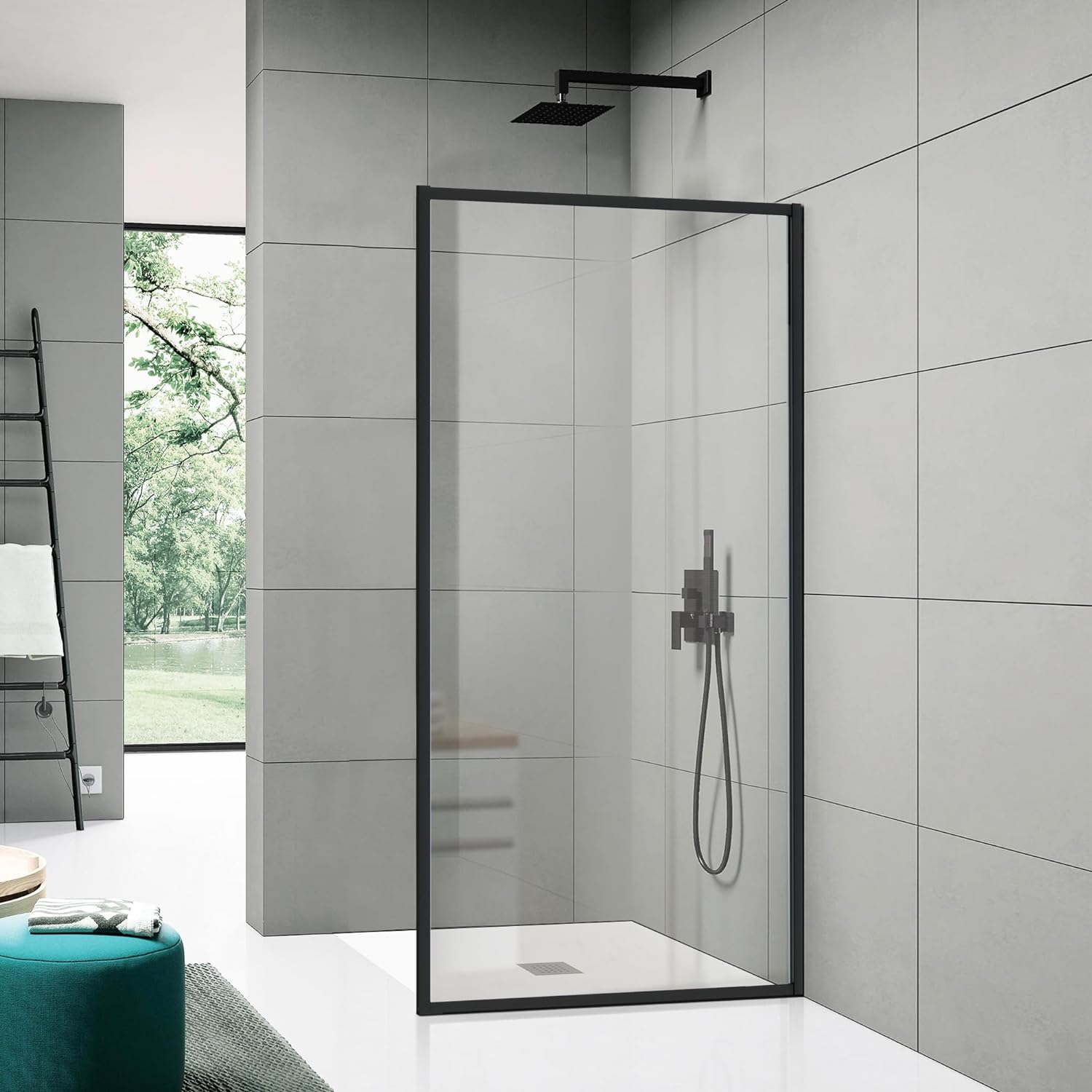
Maintenance and Cleaning of Frameless Shower Door
Maintaining and Cleaning Your Shower Door: Proper maintenance and cleaning of your shower door are crucial for preserving its appearance and extending its lifespan. Shower doors are constantly exposed to moisture, soap residue, and mineral deposits, making regular upkeep essential to prevent buildup and maintain functionality.
Cleaning Glass Shower Doors: Glass shower doors are prone to developing soap scum, hard water stains, and mineral deposits over time. Clear glass doors, while visually appealing, require more frequent cleaning to maintain their transparency. In contrast, frosted or textured glass can mask some buildup, though they still need regular maintenance to avoid long-term damage.
Daily Cleaning Routine
Use a Squeegee: After each shower, use a squeegee to remove water droplets from the glass surface. This simple habit minimizes water stains and prevents soap scum buildup.
Wipe Down with a Soft Cloth: A quick wipe with a microfiber cloth helps eliminate excess moisture and keeps the glass sparkling.
Ensure Proper Ventilation: Leave the shower door slightly open after use to allow air circulation, reducing moisture buildup.
Weekly Cleaning Routine
Prepare a Cleaning Solution: Mix equal parts white vinegar and water in a spray bottle. This eco-friendly solution is effective against soap scum and hard water stains.
Spray and Wipe: Spray the solution on the glass and let it sit for a few minutes before wiping it clean with a soft cloth or sponge.
Rinse and Dry: Rinse the glass with warm water and dry it thoroughly with a microfiber cloth to prevent water spots.
Monthly Deep Cleaning
Use a Specialized Glass Cleaner: For tough stains, use a commercial glass cleaner designed for shower doors.
Apply a Glass Protector: Consider applying a glass protector or water-repellent product to reduce future buildup and make cleaning easier.
Cleaning the Frame and Hardware
The frame and hardware of your shower door also need regular attention to prevent corrosion and ensure smooth operation.
Use Mild Cleaners: Avoid harsh chemicals that can damage metal finishes. Instead, use a mild soap or a mixture of water and vinegar.
Wipe with a Soft Cloth: Use a soft cloth or sponge to clean metal components, paying special attention to where the frame meets the glass.
Prevent Corrosion: Dry metal parts after cleaning to reduce the risk of rust or corrosion, especially in areas with high humidity.
Maintaining Door Tracks and Hinges
Inspect for Debris: Regularly check door tracks and hinges for dirt, hair, and other debris that can affect door movement.
Clean with a Soft Brush: Use a soft brush or toothbrush to gently remove buildup from door tracks.
Lubricate Moving Parts: Apply a silicone-based lubricant to hinges and tracks to ensure smooth operation and prevent squeaking.
Avoiding Common Mistakes
Skip Abrasive Tools: Avoid using abrasive scrubbers, steel wool, or harsh chemicals, which can scratch the glass or damage metal finishes.
Don’t Neglect Seals and Gaskets: Check seals and gaskets regularly for wear and tear. Replace damaged parts promptly to maintain a watertight seal.
Avoid Hard Water Buildup: If your home has hard water, consider installing a water softener to reduce mineral deposits on your shower door.
Long-Term Maintenance Tips
Professional Maintenance: Schedule professional maintenance if you notice persistent stains, damaged hardware, or issues with door alignment.
Inspect Regularly: Conduct regular inspections to catch potential problems early, such as loose screws, rust spots, or misaligned doors.
Maintain Ventilation: Ensure your bathroom has proper ventilation to control humidity and reduce the risk of mold and mildew growth.
Final Thoughts
Consistent cleaning and maintenance of your shower door can keep it looking like new while prolonging its functional life. By incorporating daily habits, using appropriate cleaning products, and addressing issues promptly, you can enjoy a sparkling, well-maintained shower enclosure for years to come.
Accessibility Features
Incorporating Accessibility Features into Shower Doors: Incorporating accessibility features into shower doors has become a vital aspect of modern bathroom design, emphasizing safety, convenience, and inclusivity. Homeowners increasingly prioritize features that support mobility, ensuring that bathrooms remain functional and welcoming for people of all ages and abilities.
Key Accessibility Features: Grab Bars: Installing sturdy grab bars inside and around the shower area provides essential support for users with limited mobility. These bars reduce the risk of slips and falls, making the shower safer and more secure.
Low-Threshold Designs: Low-threshold or curbless shower entries eliminate the need to step over a raised edge, offering seamless access. This feature is especially beneficial for wheelchair users or individuals who find it challenging to lift their legs over a traditional shower curb.
Walk-In Showers with Frameless Doors: Walk-in showers equipped with frameless glass doors are popular for accessibility. They offer a spacious, barrier-free entrance, ensuring easy access and reducing tripping hazards. Frameless designs also create a modern and open aesthetic.
Wide Door Openings: Selecting shower doors with wide openings ensures that individuals using mobility aids, such as walkers or wheelchairs, can enter the shower area comfortably.
Additional Safety Considerations: Non-Slip Flooring: Choosing slip-resistant tiles or mats inside the shower helps prevent accidental slips, offering extra stability and peace of mind.
Shower Seating: Built-in or portable shower seats provide a safe place to sit while showering, enhancing comfort and reducing fatigue for those with limited standing endurance.
Adjustable Showerheads: Handheld showerheads with adjustable heights allow for customized use, accommodating users of varying heights and mobility levels.
Proper Lighting: Well-lit shower areas improve visibility and minimize the risk of accidents, especially for seniors or individuals with vision impairments.
Design Integration: Accessibility features can be seamlessly integrated into the overall bathroom design without sacrificing style. Modern grab bars come in various finishes to match hardware, while low-threshold showers blend into minimalist or contemporary bathroom layouts.
By incorporating these thoughtful design elements, homeowners can create a shower environment that is both safe and stylish, ensuring comfort and accessibility for every family member.
6. New and Evolving Designs – frameless shower door
Smart Shower Screens and Doors
The integration of smart technology into shower screens and doors represents the next frontier in modern bathroom design. One of the most innovative features is smart glass technology, which allows glass panels to switch from transparent to opaque at the touch of a button. This feature provides instant privacy without the need for additional curtains or blinds, enhancing both functionality and aesthetics.
Advanced digital controls further elevate the shower experience by enabling precise regulation of water flow, temperature, and even lighting. Some smart shower doors come equipped with built-in sensors that detect leaks or water overflow, reducing the risk of water damage. Voice-activated assistants can also be integrated, allowing users to control shower settings through simple voice commands.
Safety is another critical consideration in smart shower doors. Many models include shatter-resistant glass and anti-fogging coatings, ensuring a safe and clear showering environment. These features combine luxury, convenience, and peace of mind, making smart shower doors a desirable addition to modern bathrooms.
Sustainability Trends
As environmental consciousness grows, sustainability has become a central focus in shower door design. Manufacturers are increasingly using eco-friendly materials such as recycled glass, aluminum, and sustainably sourced wood for frames and handles. These materials reduce environmental impact while maintaining durability and style.
Water conservation is also a driving trend, with innovative water-saving technologies being integrated into shower door systems. Low-flow doors, water-recycling systems, and smart water monitors help reduce water usage while maintaining a luxurious shower experience.
Some models feature temperature regulation systems that prevent water from flowing until the desired temperature reaches, minimizing waste.
Sustainability extends to production processes as well, with manufacturers adopting greener methods, including energy-efficient production and reduced chemical use. These practices reflect a broader industry shift toward environmental responsibility.
Innovative Opening Mechanisms
Shower door technology has seen significant advancements in opening mechanisms, resulting in doors that are both highly functional and visually appealing. Smooth-gliding sliding doors now feature quieter operation due to advanced roller and track systems. Hinged doors with cutting-edge pivoting technology allow for wider openings and improved accessibility, making them ideal for all users, including those with mobility challenges.
Motion-sensor shower doors represent another leap in innovation, offering hands-free convenience. These doors open and close automatically, adding a futuristic touch to the bathroom while reducing contact points for improved hygiene.
Magnetic and soft-close mechanisms ensure gentle closing, minimizing noise and reducing wear and tear. Frameless designs with custom pivot points and multi-directional hinges provide unparalleled design flexibility while enhancing modern aesthetics.
By incorporating these advanced features, shower door systems now combine seamless operation, user comfort, and contemporary style, redefining the modern shower experience.
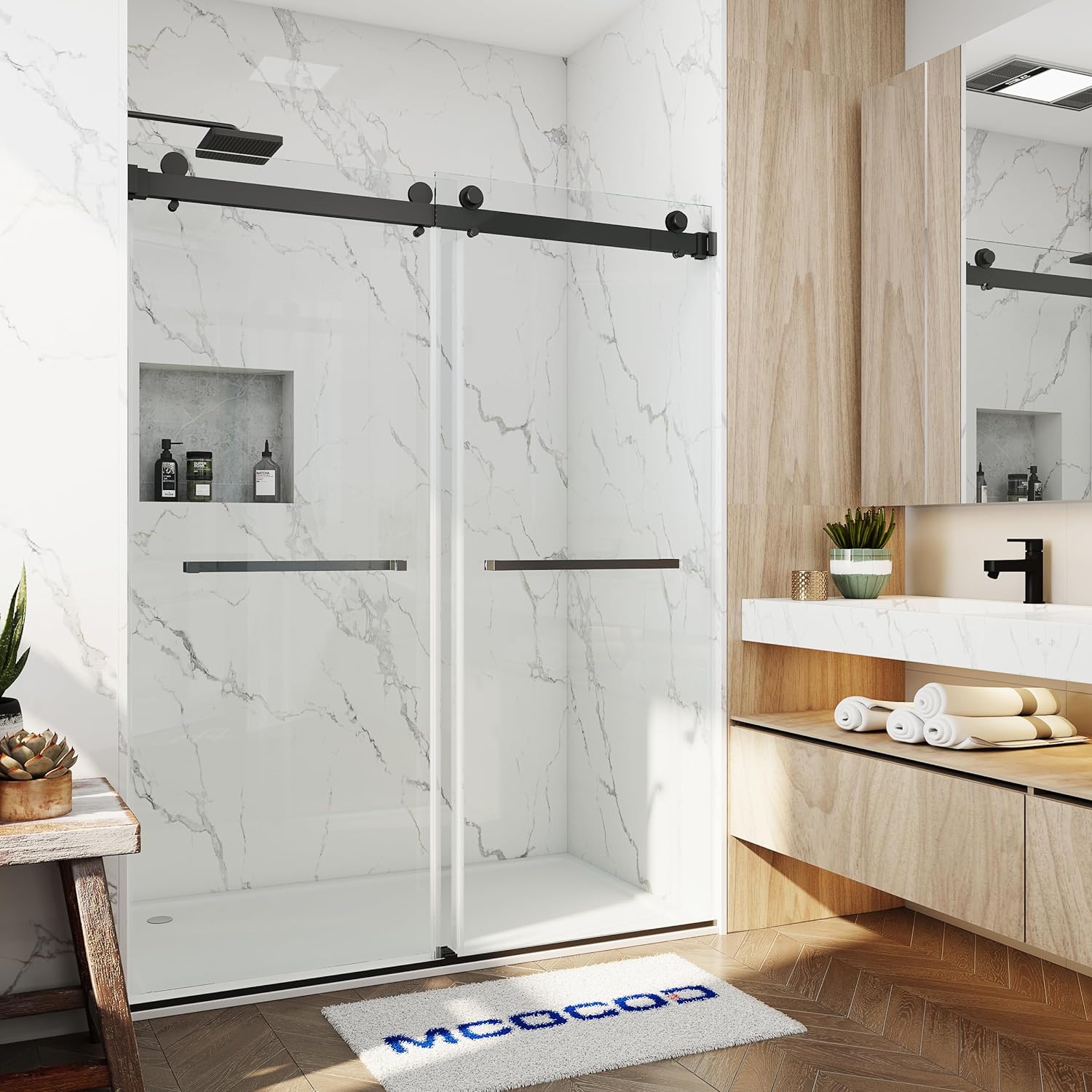
7. Selecting the Right Shower Door – frameless shower door
Assessing Layout and Space
Choosing the right shower door begins with a comprehensive evaluation of your bathroom’s layout and available space. This assessment ensures that the selected door type not only fits physically but also enhances the room’s overall functionality and aesthetics.
For smaller bathrooms, space-saving options such as sliding or bi-fold shower doors are ideal. Sliding doors move along tracks, requiring no additional clearance, making them perfect for compact areas. Bi-fold doors, which fold inward or outward, offer another space-efficient alternative. In contrast, hinged or pivot doors are better suited for larger bathrooms where ample clearance is available.
Consider the placement of fixtures such as toilets, vanities, and sinks to avoid obstructions when the door is opened. Accurate measurements are crucial, particularly for frameless shower doors that require precise installation due to their lack of structural frames. A professional installer can ensure that measurements are accurate and the door fits securely.
Properly assessing the layout and space can improve not only the practicality of the shower area but also its visual appeal. A well-chosen door can transform the bathroom, creating a sense of openness, luxury, and comfort.
Matching with Bathroom Decor
Selecting a shower door that complements your bathroom’s existing decor is essential for achieving a cohesive design. Consider the overall style of the space, including its color palette, materials, and fixtures.
Frameless shower doors are renowned for their modern, minimalist appeal. Their clean lines create an open, airy feel, making even smaller bathrooms seem more spacious. These doors can seamlessly integrate with contemporary and transitional designs, emphasizing simplicity and elegance.
Framed shower doors, on the other hand, provide a more traditional aesthetic. The frame can be customized with various finishes, such as chrome, brushed nickel, or matte black, adding character and depth to the space. This makes framed doors suitable for classic, vintage, or industrial-inspired bathrooms.
Glass type also plays a crucial role in enhancing decor. Clear glass showcases intricate tile work and luxurious fixtures, while frosted or textured glass adds privacy and a touch of sophistication. Custom etching or decorative patterns can further personalize the shower door, reflecting your unique style.
Finally, consider hardware and handles that align with your bathroom’s overall design. Elegant knobs, bar handles, or even concealed hinges can elevate the shower door’s appearance, making it a focal point while maintaining functional integrity.
Budget Considerations – Frameless Shower Door and Framed Shower Doors
Balancing budget, quality, and design is essential when selecting a shower door. Frameless shower doors, known for their modern and sleek appearance, are typically more expensive due to their thicker glass and specialized hardware. However, they offer exceptional durability, easier maintenance, and a luxurious aesthetic that can increase the overall value of your home.
If budget is a concern, consider investing in mid-range frameless doors with treated glass to resist stains and watermarks, reducing long-term cleaning and maintenance costs. Custom features such as patterned glass or premium hardware may add to the expense but enhance the door’s visual appeal and functionality.
Framed shower doors are often more budget-friendly while still providing a stylish and functional solution. Their metal frames provide added stability, allowing for the use of thinner glass, which can significantly reduce costs. Available in a variety of finishes, framed doors can complement both modern and traditional bathroom styles.
When planning your budget, factor in installation costs, especially for frameless doors that require expert fitting. Compare different brands and styles, considering warranties and customer reviews. A well-researched investment can offer a balance between affordability and long-lasting performance.
Future-Proofing Your Choice
Future-proofing your shower door selection ensures that your investment remains functional, stylish, and adaptable for years to come. This approach involves choosing timeless designs, durable materials, and modern features that align with both current and evolving bathroom trends.
Opt for classic styles that transcend fads, such as frameless glass doors with simple, clean lines or framed doors with elegant finishes. High-quality tempered glass ensures safety and longevity, while corrosion-resistant hardware prevents wear and tear.
Consider practical features such as easy-clean glass coatings that repel water and reduce the buildup of soap scum and mineral deposits. Adjustable hinges, self-closing mechanisms, and magnetic seals can improve functionality and minimize future maintenance requirements.
Additionally, think about how the shower door will integrate with potential future renovations. Versatile designs with customizable features can adapt to changing styles, while neutral finishes and classic shapes offer enduring appeal.
By selecting a shower door with long-term usability in mind, you can create a bathroom that remains stylish, functional, and easy to maintain for years to come.
8. Finding the Perfect Shower Door – frames vs Frameless shower door
When selecting the perfect shower door, you must carefully consider a range of factors to ensure it fits seamlessly into both your bathroom’s design and your personal lifestyle. With the multitude of options available on the market today, choosing the right shower door can be an overwhelming task. However, by focusing on key elements such as layout, personal style, glass preferences, and door functionality, you can make an informed decision that will enhance both the aesthetics and functionality of your bathroom.
Whether you’re drawn to the modern sophistication of frameless doors or the classic durability of framed options, understanding the nuances of each choice will help you select a door that perfectly meets your needs.
Shower Layout and Space Considerations
The layout and size of your bathroom and shower space should be the primary factor influencing your choice of shower door. Whether you’re dealing with a small corner shower, a spacious walk-in shower, or a tub-shower combo, the design and configuration of your bathroom will impact what type of shower door will work best.
Corner Showers: If your shower is located in the corner of your bathroom, a bi-fold or sliding door might be ideal, as these doors don’t require a large opening space. They can help save room in tight areas while providing ease of access.
Walk-In Showers: For a more open, airy design, a walk-in shower might suit a frameless or hinged door. These doors can be installed to offer a clear, unobstructed view, creating the illusion of a larger space while still providing protection from water splashing outside.
Bathtub Showers: If you have a bathtub with a shower feature, a shower screen or a hinged door that swings out may work better. It’s essential to ensure that the door won’t interfere with the tub’s use or the surrounding space.
The key here is ensuring that your door complements the layout, offering sufficient room for entry and exit while keeping the shower space functional and comfortable.
Aesthetic Preferences: Frameless vs. Framed Doors
The choice between framed and frameless shower doors is one of the most important aesthetic decisions. Both styles offer distinct visual appeal and can dramatically alter the atmosphere of your bathroom. Here’s a deeper look at each option:
Frameless Shower Doors: Known for their sleek, modern, and minimalist design, frameless shower doors are often made of thicker, tempered glass. These doors are typically attached to the wall with minimal hardware, creating a clean, open look that showcases the beauty of the tile and the overall design of the shower. Frameless doors are perfect for those who value a contemporary and spacious feel in their bathroom. They are ideal for larger shower spaces and add a luxurious touch, though they tend to come at a higher price point.
Framed Shower Doors: Framed doors are the traditional option, featuring metal framing around the glass. While they may not have the same visual lightness as frameless doors, they offer a sturdy, durable option at a more affordable price point. Framed doors are often chosen for their structural integrity, as the metal framing helps provide support to the glass. They are ideal for smaller showers or where a more classic or vintage style is desired. The frames also help prevent water from escaping, making them a great option for tight spaces.
Your choice between frameless or framed will depend on the style and functionality you want for your bathroom. Frameless doors provide a sleek, high-end appeal, while framed doors deliver a timeless, sturdy option with practical benefits.
Glass Preferences: Transparency, Privacy, and Durability
The type of glass you select for your shower door can significantly affect both the functionality and the overall look of your bathroom. Shower glass options come in various textures, finishes, and thicknesses, each offering unique benefits:
Clear Glass: This is the most popular choice for shower doors, particularly with frameless models. Clear glass offers an open and airy feel, enhancing natural light and giving the bathroom a more spacious look. It’s ideal for showcasing beautiful tiles and creating a clean, modern aesthetic.
Frosted or Textured Glass: If privacy is a concern, frosted or textured glass provides a perfect solution. This type of glass blurs the view, allowing light to pass through while preventing visibility. It’s great for shared bathrooms or where privacy is a priority but you still want to keep the space feeling open.
Tinted Glass: Tinted glass offers a subtle touch of color, often in shades of grey or bronze. It can provide a unique visual effect while also offering some degree of privacy. Tinted glass is also helpful in reducing the amount of water spots and soap scum visible on the glass, making it easier to maintain.
Tempered Glass: Most shower doors are made from tempered glass, which is heat-treated to increase strength. This glass is designed to withstand the pressures of everyday use, ensuring safety and durability. While tempered glass is a great option for longevity and security, it’s important to ensure that the glass is properly sealed to prevent water damage and staining.
Choosing the right glass depends on your aesthetic preferences, the level of privacy you require, and your desire for easy maintenance.
Functionality: Door Operation and Ease of Use
Beyond the style and materials, the functionality of the door itself is equally important. You need a door that opens and closes easily, provides a watertight seal, and fits your space. The two most common door types are hinged and sliding doors, but there are a variety of other options available:
Hinged Doors: These doors swing open and closed like a standard door. They’re ideal for larger shower spaces and provide a more traditional, elegant look. However, hinged doors require enough space to open fully without obstruction, so they may not be suitable for smaller bathrooms.
Sliding Doors: Perfect for tight spaces, sliding shower doors glide open and closed without the need for a wide clearance. These doors are ideal for smaller bathrooms or corner showers where swinging doors might not be practical.
Bi-Fold and Accordion Doors: These space-saving designs fold open like an accordion, making them great for bathrooms where maximizing available space is a priority.
Push-to-Open or Auto-Close Mechanisms: Some modern doors come with advanced features such as push-to-open or auto-close mechanisms, providing added convenience and accessibility, especially for users with mobility issues.
Aligning Style with Practical Needs
Ultimately, selecting the right shower door comes down to a balance between aesthetics, space constraints, and functionality. A well-chosen shower door doesn’t just serve as a functional barrier between water and the rest of your bathroom; it’s an essential design element that ties together the overall look and feel of your space.
Whether you opt for the minimalist elegance of a frameless door or the durable, classic appeal of a framed one, the perfect shower door should reflect your personal style while enhancing your bathroom’s usability and aesthetic. When making your decision, consider how each option fits with your layout, complements your glass preferences, and meets your functional needs. The right shower door will elevate your bathroom, transforming it into a more stylish, practical, and efficient space.
9. Summing Up – frameless shower door
In conclusion, selecting the right shower door is a decision that involves more than just choosing a style or material; it requires careful consideration of several factors that will ultimately impact the functionality, aesthetics, and longevity of your bathroom. From the layout and decor of your space to your budget and even future-proofing your investment, every aspect plays a role in determining the ideal shower door for your needs.
Shower Layout and Bathroom Design
One of the most important factors to consider when choosing a shower door is the layout of your bathroom. The space available and the specific design of your shower will influence the type of door that will work best. For example, in a compact bathroom, a sliding or bi-fold door might be ideal as these options don’t require extra space to open, unlike hinged doors. On the other hand, in a spacious walk-in shower, you might prefer a frameless or hinged door to maintain an open, airy feel and allow for ease of access.
The overall bathroom design should also be considered. A sleek, modern bathroom may benefit from a frameless shower door, which offers a clean, minimalist aesthetic. A more traditional bathroom might lend itself well to a framed shower door, which provides a sturdy, classic look. Whichever style you choose, ensure that the door complements the rest of your bathroom design, from the tiles to the fixtures.
Budget and Cost Considerations
Budget constraints are another crucial factor when selecting a shower door. Frameless shower doors, while visually appealing, tend to be more expensive due to the thicker, tempered glass used and the minimal hardware required. While they provide a high-end look, they might not be feasible for everyone, especially if you’re working with a more limited budget.
Framed shower doors, on the other hand, are typically more affordable and provide a solid option for those looking to maximize value while still getting a durable, functional door. Sliding doors and bi-fold doors can also offer a cost-effective solution without compromising too much on style or practicality.
Keep in mind that while the upfront cost is an important consideration, you should also think about the long-term value. Investing in high-quality materials and construction can save you from having to replace the door prematurely due to wear and tear, which can ultimately save you money in the long run.
Durability and Future-Proofing
A well-chosen shower door should not only meet your immediate needs but should also stand the test of time. Consider durability when selecting a shower door, especially since it will be exposed to water, moisture, and frequent use. Choose materials that can withstand daily wear without compromising their appearance or function.
Tempered glass, commonly used in both framed and frameless shower doors, is a durable, heat-treated material that can resist breakage, providing peace of mind regarding safety. It’s also relatively easy to clean and maintain, which helps in future-proofing your investment.
Another key consideration for future-proofing your shower door is ensuring that it remains functional and aesthetically appealing for years to come. Features like corrosion-resistant hardware, proper seals to prevent water leakage, and glass treatments that reduce soap scum build-up can make your shower door more resilient and easier to maintain over time. Additionally, selecting a timeless design will ensure that your shower door doesn’t go out of style as bathroom trends evolve.
Balancing Practical Considerations with Aesthetic Preferences
Selecting a shower door is about balancing functionality with personal style. While it’s easy to focus on aesthetics, you should also take into account practical considerations, such as ease of cleaning, water resistance, and how the door opens and closes. A door that looks great but is difficult to maintain or doesn’t function properly can ultimately become more of a burden than a luxury.
If you choose a frameless door for its sleek, modern appearance, remember that the absence of a frame requires more attention to keeping the glass clean and properly sealed to avoid water damage. On the other hand, framed doors may require less maintenance, but they may not offer the same contemporary look as frameless options.
The door’s operation is another factor to consider. Hinged doors may offer a traditional, elegant look but may not work well in a tight space, whereas sliding doors are ideal for compact bathrooms but may lack the visual appeal of a hinged or frameless design. Choose a door that matches both the practicalities of your space and your aesthetic preferences to create a cohesive, functional bathroom design.
Enhancing the Shower Experience
A shower door does more than just separate the shower from the rest of the bathroom – it’s an essential element that can elevate your entire shower experience. The right door can improve accessibility, enhance the overall ambiance of the bathroom, and contribute to a more enjoyable shower routine. For example, a frameless shower door with clear glass creates a sense of openness and tranquility, allowing the beauty of the shower tiles to shine through, making the space feel larger and more luxurious.
Alternatively, a frosted or textured glass door offers a sense of privacy while still allowing natural light to flood the space, creating a serene, spa-like atmosphere.
Summary
Selecting the right shower door requires thoughtful consideration of your space, budget, and long-term needs. Whether you opt for a frameless, sliding, or hinged door, ensure that your choice enhances the functionality and style of your bathroom while fitting your practical requirements. A well-chosen shower door not only elevates the look of your bathroom but also adds to the enjoyment and ease of your daily shower routine.
By balancing practical considerations with aesthetic preferences, you can achieve a shower setup that works beautifully for both the present and the future, creating a stylish and functional bathroom space.
Frequently Asked Questions
Framed shower doors are constructed with a metal frame that surrounds the glass panels, providing extra support and stability. The frame typically consists of aluminum or steel, offering a more traditional and structured appearance. Frameless shower doors, on the other hand, use thicker tempered glass and minimal hardware, creating a sleek, modern, and open feel. The absence of a full metal frame gives frameless doors a cleaner, more contemporary look, while framed doors are considered more robust, especially in terms of structural integrity. Frameless doors can be more difficult to install due to the need for precise measurements and special support brackets, while framed doors tend to be easier to install, and may be more budget-friendly. Frameless doors are often preferred in high-end bathroom designs, while framed doors might be chosen for their practicality and affordability.
Framed shower doors are often a better choice for small bathrooms because their sturdy metal framing helps define the shower space and prevents water leakage. In a smaller room, framed doors can also make the space feel more enclosed, which might be desirable for some homeowners. Frameless doors, on the other hand, can provide an airy, open feel that makes small spaces appear larger and less crowded.
However, the lack of a frame may lead to a slightly higher likelihood of water splashing outside the shower area unless proper installation and sealing are done. In terms of functionality, framed doors can be a bit more practical in smaller bathrooms due to their structure and support. Frameless doors can still work, but they may require extra attention to detail to avoid water leakage and to ensure durability.
Yes, frameless shower doors are generally easier to clean compared to framed ones. This is because they lack the metal frame where soap scum, grime, and water stains tend to accumulate. Framed shower doors have crevices and joints where dirt and buildup can be more difficult to reach and clean effectively. With frameless doors, the glass is more exposed, making it easier to wipe down with a squeegee or cleaning cloth.
Additionally, many frameless doors are made of tempered glass, which is resistant to water spots and stains when treated with the right products. However, both framed and frameless doors require regular maintenance to prevent soap scum and mineral buildup, especially in areas with hard water. Frameless doors may still require occasional cleaning around the hinges and seals, but overall, they are easier to maintain in terms of surface cleaning.
Framed shower doors tend to provide better water containment due to their structured metal frames, which make it easier to create a tighter seal between the door and the shower walls.
The rubber or vinyl seals around framed doors also help in preventing water from leaking outside the enclosure. Frameless shower doors, while visually appealing, have minimal seals and hardware, making them slightly less effective at containing water, especially if the installation isn’t perfect.
The glass panels of frameless doors are typically thicker to prevent bending, but they rely on precise installation and sealing to minimize water leakage. However, with proper installation and the use of high-quality seals, frameless doors can still offer excellent water containment.
The primary advantage of choosing frameless shower doors is the aesthetic appeal. They provide a sleek, minimalist look, giving bathrooms a more open and modern feel. Without the bulk of a frame, frameless doors create a cleaner visual line, enhancing the overall design of the space. Another key benefit is the ability to show off attractive tile work inside the shower.
Frameless doors also tend to have more flexibility in terms of design options, as they can be customized to suit a variety of shower shapes and sizes. In addition, they are easier to clean because there are no frames or seals that trap soap scum and grime. Frameless doors are also durable, made with thicker tempered glass that is stronger and less prone to breakage. Overall, frameless doors are preferred by those looking for a luxurious, contemporary bathroom upgrade.
While frameless shower doors offer several benefits, they also come with a few drawbacks. One of the main downsides is the cost—framed doors are generally more budget-friendly, while frameless doors require thicker glass and specialized hardware, making them more expensive. Additionally, frameless doors can be more difficult to install due to the precise measurements and specialized support required for the thicker glass.
Another potential disadvantage is the higher risk of water leakage if not properly installed, as frameless doors often have fewer seals and seals that may not create as tight a barrier as those on framed doors. Finally, frameless doors require more careful maintenance to ensure the glass remains spotless, as they show water spots and soap scum more clearly than framed doors.
Framed shower doors tend to be more durable in terms of structural integrity because the metal frame provides additional support for the glass panels. This makes framed doors a better option for situations where the shower is in constant use or is subject to rougher handling. They are also less prone to cracking or damage because the frame offers added protection.
Frameless doors, while made from thicker tempered glass, rely solely on the glass for stability, and if the glass is improperly installed or subjected to significant force, it could break or become damaged more easily. However, frameless doors are still very durable when installed properly, and the glass used is toughened to resist impact. The main difference lies in the type of protection provided by the frame versus the minimalist design of frameless options.
Yes, frameless shower doors can be customized to fit any bathroom, which is one of their biggest advantages. Because they are made with thicker glass panels and minimal hardware, frameless doors offer flexibility in design and size. Custom frameless doors can be made to fit non-standard shower openings or irregularly shaped spaces, allowing for a tailored look that works with the specific dimensions of the bathroom.
This customization allows homeowners to select door styles, glass types (clear, frosted, etched, etc.), and hardware finishes that match their bathroom’s decor. While frameless doors can be more expensive and require a professional installer to ensure a perfect fit, they provide the most flexibility for unique or custom bathroom layouts
Framed shower doors can be installed by a skilled DIYer, but professional installation is often recommended for the best results. The frame provides a guide for the door installation, making it easier to line everything up, but precise measurements and correct sealing are essential to avoid leaks. Many people choose to hire a professional to ensure that the installation is done correctly and that the door is securely mounted.
Frameless shower doors, on the other hand, generally require professional installation, as the process is more complex and requires precise measurements and careful handling of the heavy, tempered glass. Frameless doors often need specialized supports and anchors, which makes professional installation a necessity.
Framed shower doors are typically less expensive than frameless doors due to the simpler design and lighter materials used in their construction. The metal frame used in framed doors can be mass-produced and is less costly than the thicker, tempered glass required for frameless doors. The labor involved in installing framed doors is also generally less expensive, as the installation process is more straightforward.
Frameless doors, on the other hand, tend to be more expensive because they use thicker glass, have more complex hardware, and often require custom measurements. The cost of professional installation is also higher for frameless doors due to the need for precision and special supports. Overall, while framed doors offer a more budget-friendly option, frameless doors are a luxury choice that can significantly increase the overall cost of a bathroom renovation.
Featured Related Articles
For Quality Bathroom Supplies Visit
Modern Bathrooms
✓ Bidets, Toilets, Faucets
✓ Freestanding Bathtubs, Sinks

